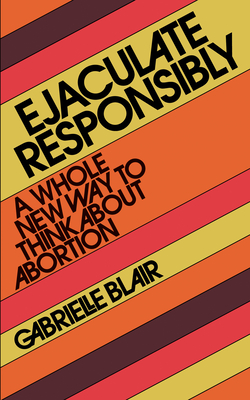Ejaculate Responsibly Book Summary
A Whole New Way to Think About Abortion
TL;DR
In 'Ejaculate Responsibly,' Gabrielle Stanley Blair argues for a shift in the abortion debate, emphasizing men's accountability in preventing unwanted pregnancies and challenging societal stigmas surrounding male contraception.
What is Ejaculate Responsibly about
'Ejaculate Responsibly' addresses the abortion issue in a post-Roe America by shifting focus from women's control over their bodies to men's responsibility in preventing pregnancies. Gabrielle Blair presents 28 concise arguments highlighting how men are disproportionately not held accountable for pregnancy prevention. The book offers an accessible yet profound exploration of male fertility, the gendered burden of contraception, and the often unexamined social stigmas surrounding male birth control methods. Blair's writing is infused with humor and clarity, making her points both engaging and thought-provoking, ultimately advocating for a more equitable distribution of responsibility in reproductive health.
Ejaculate Responsibly 5 Key Takeaways
Understanding Male Fertility
Blair highlights that men are constantly fertile, in contrast to women who have a limited fertility window each month, thus underscoring the importance of men's role in pregnancy prevention.
Responsibility Shift
The book argues that societal norms have unfairly placed the burden of pregnancy prevention on women, advocating for a cultural shift where men take equal responsibility.
Stigmas Around Male Contraception
Blair addresses the misconceptions that contraception for men is less pleasurable or socially acceptable, arguing for a broader acceptance of methods like condoms and vasectomies.
Market Inequality in Birth Control
The author points out that 90% of the birth control market caters to women, indicating a significant imbalance in how reproductive health is approached by society.
Humor as a Tool
Blair uses humor to engage readers while discussing serious topics, making her arguments more relatable and easier to digest.
Top Ejaculate Responsibly Quotes
- We need to stop focusing solely on women’s decisions and start placing equal emphasis on men’s responsibility in preventing pregnancy.
- The reality is that men can have the power to change the conversation around abortion simply by being accountable for their actions.
Who should read Ejaculate Responsibly?
'Ejaculate Responsibly' is ideal for readers interested in gender studies, reproductive rights, and social justice. It provides valuable insights for anyone seeking to understand the complexities of the abortion debate and the importance of shared responsibility in sexual health.
Ejaculate Responsibly Best Reviews
- The New York Times praises 'Ejaculate Responsibly' as a bold rethinking of a contentious issue, illuminating the need for shared accountability in reproductive health.
- Kirkus Reviews calls the book an essential read, commending its humor and clarity in addressing deeply ingrained societal attitudes toward contraception and responsibility.
People also liked these summaries
Ejaculate Responsibly FAQs
What is the main argument of 'Ejaculate Responsibly'?
'Ejaculate Responsibly' argues for greater accountability from men in the context of preventing unwanted pregnancies, shifting the focus from women's bodies to men's responsibilities.
Why is male contraception discussed in this book?
Blair discusses male contraception to highlight the stigmas and misconceptions that prevent men from engaging in responsible reproductive practices, advocating for a cultural shift towards shared responsibility.
